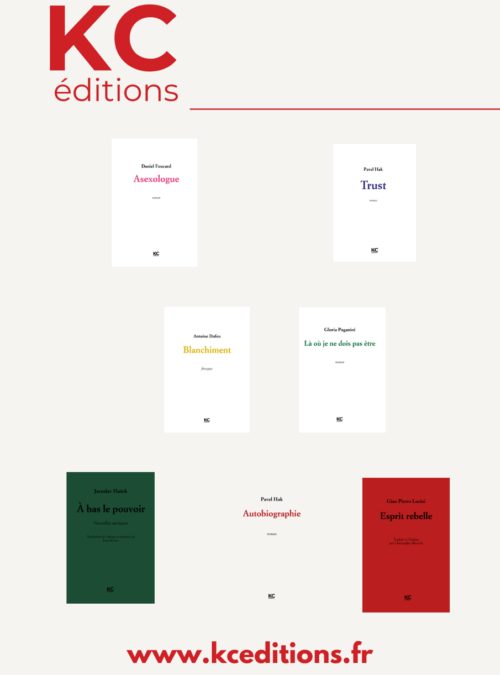Interview with Piero Somaglino, editorial director at SEB27
Author: Paolo Grossi

Piero Somaglino prefers the artisanal title of editorial writer to that of editor, a profession that has earned him a living for over thirty years. Previously, he was interested in theatre, both in practice and history, as well as an impressive number of other occasional pursuits. Having spent a lot of time between the aspirations of authors and the reluctance of readers, he has acquired a detached awareness of the meaning of literary creation and the ‘infinite vanity of everything’. When he is not working, he reads mainly for pleasure, enjoys lying in a hammock and travels the continent by bicycle. In 2021, to mark the thirtieth anniversary of Edizioni SEB27, he published Avere una musa di fuoco, a narrative odyssey, an allegory of theatre that is both historical reconstruction and a definitive tribute to his masters.
Can you briefly tell newitalianbooks readers how SEB27 was founded (its history, the origin of its name, its programme)?
Edizioni SEB27 was conceived in the early 1990s. It was incubated by a group of people who shared a certain idea of theatre, which Gian Renzo Morteo had attempted to define in his book Ipotesi sulla nozione di teatro (Hypotheses on the Notion of Theatre, 1972, 2019).
Together with Marco Chianale, Paola d’Altoè and Fabrizio Dassano, we became passionate about research and gained experience in writing, editing, layout and printing with Linea teatrale (An idea of theatre), a study journal linking the local area and the university.
The four of us, like all young people from what was then called the Faculty of Arts and Philosophy, were regular ghostwriters for various publishing houses or chroniclers of ‘unmissable’ local events for newspapers of varying importance. Putting our hunger and thirst together, we created an editorial services company, which quickly became a publishing house. We made this decision one evening in a tavern, when enthusiasm tempered by excellent ‘disgusting’ wine took precedence over practicality. The name was chosen a little later, when the tavern owner threw us out so he could finally close up shop, and we found ourselves taking notes by the light of a street lamp: its registration number was ‘SEB27’.
What has been the journey of Edizioni SEB27 from its creation to today? Have there been any changes of direction or developments in one direction or another?
Since its creation in 1992, Edizioni SEB27 has always had a penchant for historical essays and issues of civil interest that challenge the present. Over the years, interest in theatre and the performing arts in general has remained strong, finding expression in the study and research works of the ‘Linea teatrale’ collection, which takes its name from the former magazine founded by Gian Renzo Morteo. In ‘Tamburi di carta’ (Paper Drums), the focus on memory shifts from essays to narrative. There are also more specialised areas, such as the ‘Psicoanalisi Lacaniana’ (Lacanian Psychoanalysis) collection, and educational projects, such as LCMS, dedicated to the study of the Chinese language. In producing the entire editorial offering, the teachings of tradition are always scrupulously respected: graphic design, printing, binding and editorial care are an essential constant.
What does the SEB27 catalogue look like today? What are your ambitions for the future?
The catalogue includes works intended to stand the test of time: many texts in the field of history, which show the roots of issues that continue to ramify to the present day, are offered in the ‘Laissez passer’ collection. In his book Isole del sole (Islands of the Sun), historian Andrea Villa traces the history of Italian colonisation of the Dodecanese islands in a fascinating account.
In Donne ai tempi dell’oscurità (Women in the Time of Darkness), Italian-Argentinian historian Norma Berti recounts and analyses the prison experience of female political prisoners under the Videla dictatorship. Counting herself among their number, she describes how the regime persecuted these citizens even more fiercely because they were doubly scandalous: as opponents of the regime and as women who should not have been involved in politics. The books by Marisa Sacco, La pelliccia di agnello bianco (The White Lamb’s Fur), and Marisa Ombra, La bella politica (The Beautiful Politician), offer a female perspective on the struggle for liberation from fascism, but also on the struggle to gain credibility in the male-dominated post-war political world. With great literary quality, these two works bear witness to the value of two women who risked their lives to regain their freedom in the face of dictatorship, as well as to the lifelong dedication of their two authors to ‘beautiful politics’ and historical memory. Esther Béjarano, forcibly recruited as a musician in the Auschwitz orchestra, also devoted much of her life to reminding people of the atrocities of the past and those that still persist today. The book La ragazza con la fisarmonica (The Girl with the Accordion) recounts her experience of deportation to Auschwitz and Ravensbrück, but also analyses the resurgence of racism, nationalism and fascism in the present day. At the age of 95, Esther Béjarano sang with rappers to convey messages of peace and brotherhood between peoples to younger generations; from the stage, she recalled the experiences of refugees of yesterday and today, those fleeing dictatorships, wars and other forms of misery. Esther Béjarano (who passed away in July 2021) was concerned with these issues, as was lawyer Maurizio Veglio, an expert in migrant law. The lawyer titled L’attualità del male (The Relevance of Evil) the book in which he compiled the contributions of colleagues who, like him, work with the most disadvantaged foreigners. La Libia dei lager è verità processuale (Libya’s concentration camps are a legal reality) is the subtitle of the book: a detailed analysis of the systematic and shocking violation of migrants’ human rights in detention camps in Libya, perpetrated with the political and material complicity of Italy and Europe, which are happy to outsource their borders to places where the law does not exist. Veglio is also the author of La Malapena, which deals with the legal vacuum that prevails in Italy in detention and deportation centres where migrants who have been denied the right to stay are locked up. This theme is further explored in the collective work Corpi reclusi in attesa di espulsione (Bodies imprisoned awaiting deportation), published in the ‘Motivè’ collection, which illustrates administrative detention in Europe. But even those who were born or grew up in Italy are unable to obtain the rights to which they are entitled in a civilised country: the Protagonisti di un paese plurale (Protagonists of a plural country) often remain Cittadini senza cittadinanza (Citizens without citizenship), as highlighted by the titles of two books by sociologist Roberta Ricucci, who has devoted years of field research to the children of immigrants, aware that the way in which the issue of new citizens is addressed is a measure of a country’s level of civilisation. In her book Femminicidio e violenza di genere (Femicide and Gender Violence), lawyer Maria Concetta Tringali analyses this persistent cross-cutting phenomenon, which sees women engaged in an unequal struggle against their violent ex-partners and a state that, with its laws and institutions, does not protect them as it should. A book in the form of a dialogue between a long-standing lawyer, Paolo Borgna, and a journalist and philosopher, Jacopo Rosatelli, tells the story of the judiciary over the last 40 years and its Fragile indipendenza (Fragile Independence). The themes that run through the essay collections intersect with those of the ‘Tamburi di carta’ collection, which is more narrative in nature. La deutsche Vita is the story of journalist Antonella Romeo, who lived in Germany for almost twenty years: professional and personal experiences and encounters, echoed by the Italian and German past, from Nazism to the years following German reunification. The most recent work by the same author is Sgurbiol, the story told by Lelia, a sharecropper and then factory worker from Modena, whose personal journey accompanies the reader through the painful history of the formative years of our Republic and its dramatic antecedents.
In your opinion, which titles in the catalogue could be of particular interest to a foreign publisher?
Certainly many of the titles mentioned above, especially those that offer insight into contemporary events: Il disegno neoimperiale della Russia di Putin e le sue guerre (Putin’s neo-imperial project in Russia and its wars) or Giustizia e conflitti internazionali, riflessioni a partire da Ucraina, Israele e Gaza (Justice and international conflicts, reflections from Ukraine, Israel and Gaza), to name just two very recent ones. These are collections of historical and legal essays on the present, which undoubtedly have an international dimension or could be of interest to foreign publishers. Similarly, the volumes of ‘Tamburi di carta’ could also be appreciated by foreign readers. Among these are the works already mentioned by Antonella Romeo, La deutsche Vita (already published in Germany) and Sgurbiol; the fabulous and surreal tales of Alfonso Cipolla, Orchi, antropofagi e macellai (Orcs, cannibals and butchers) and Cadaveri e papere (Corpses and Ducks); the editorial memoirs of Roberto Cazzola, Un quarto di pera di Giulio Einaudi (A Quarter of pear of Giulio Einaudi) and his latest epistolary novel Luce; and the narrative essay Tra le pagine della fame (Between the Pages of Hunger), in which Luisa Ricaldone takes us on a journey through the literature that has recounted the desire for and absence of food in its many facets.










